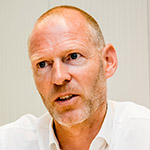Prof. dr. Peter Feys
 Peter Feys (PhD KULeuven, 2004) is full professor and was dean of the faculty of Rehabilitation Sciences at UHasselt. He is member of inter-university steering committees on master programs in rehabilitation sciences and physiotherapy in Flanders as well as in occupational sciences.
Peter Feys (PhD KULeuven, 2004) is full professor and was dean of the faculty of Rehabilitation Sciences at UHasselt. He is member of inter-university steering committees on master programs in rehabilitation sciences and physiotherapy in Flanders as well as in occupational sciences.
Peter Feys has published over 180 peer- reviewed articles in international clinical neurological and rehabilitation journals. Peter Feys is editorial board member of ‘Multiple Sclerosis Journal’, ‘Neurorehabilitation and Neural Repair’ and ‘Frontiers in Rehabilitation Sciences, Health Systems’. His inter-disciplinary research is focused on rehabilitation for gait and upper limb function in predominantly persons with neurological conditions. It comprises investigations of walking motor fatigability, music-based entrainment and sonification, cognitive-motor interference, technology-supported training, upper limb functioning and community self-directed training. Neuro-imaging is performed to understand the impact of interventions on neural function and structure. The research is mostly performed in persons with Multiple sclerosis and secondary stroke and CP. He is part of the UMSC Hasselt-Pelt consortium.
Peter Feys has been president of RIMS (Rehabilitation in MS; www.euRIMS.org), a European network of best practice and research from 2011-17 after having served as chair of the special interest group on mobility (2008-11). The European network is including MS clinical centers, MS specialized health care professionals, MS societies and MS research centers. Het is member of different international committees and workgroups, in the PMSA and PROMS (MSIF)-initiatives as well as the SRRR III initiative (stroke recovery and rehabilitation roundtable, on control interventions).
In 2018, Peter Feys contributed actively to WHO Rehabilitation Action Plan 2030 as voluntary part-time consultant. The projects are embedded in the ‘Disability and Rehabilitation’ section led by prof. dr. A. Cieza based in headquarters Geneva. A contribution was made to the ‘package of priority rehabilitation interventions’ project.
